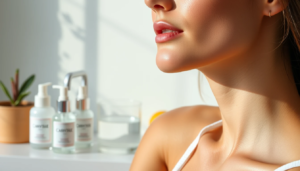Hydration plays a critical role in maintaining overall skin health and elasticity. While many focus on skincare products and routines, staying hydrated is one of the simplest yet most effective ways to ensure your skin remains supple, smooth, and resilient. In this article, we’ll dive into why hydration is essential, how it impacts skin health, and practical ways to stay hydrated for glowing, youthful skin.
Understanding Skin Elasticity and Its Importance
Skin elasticity refers to the skin’s ability to stretch and return to its original shape. It is a key indicator of skin health and is largely determined by collagen and elastin, two proteins in the dermis. Over time, factors like aging, sun damage, and dehydration can weaken these proteins, leading to sagging skin, wrinkles, and a dull complexion.
Hydration directly influences skin elasticity by maintaining the water content in skin cells. Well-hydrated skin is more resilient, plump, and less prone to fine lines or damage.
How Hydration Affects Skin Health
1. Maintains Skin Barrier Function
The skin’s outermost layer, the epidermis, relies on adequate hydration to function as a protective barrier. When hydrated, the skin barrier prevents water loss and blocks environmental irritants, keeping your skin healthy and balanced.
2. Enhances Collagen Production
Water supports cellular function, including collagen synthesis. Collagen keeps your skin firm and elastic, and without enough hydration, collagen production slows down, leading to a loss of elasticity.
3. Prevents Dryness and Flakiness
Dehydrated skin often feels tight, rough, and flaky. Proper hydration helps maintain smooth texture and prevents cracks that can lead to irritation or infections.
4. Reduces the Appearance of Fine Lines
When your skin is hydrated, it appears plumper, which can minimize the visibility of fine lines and wrinkles.
5. Supports Detoxification
Hydration aids in flushing out toxins from the skin. This can reduce inflammation and promote a clearer complexion.
Signs of Dehydrated Skin
- Tightness and dryness
- Dull or ashy appearance
- Increased sensitivity
- Fine lines appearing more prominent
- Flaky or rough patches
If you notice these symptoms, your skin may be lacking hydration.
Tips to Stay Hydrated for Healthy Skin
1. Drink Plenty of Water
The most obvious way to stay hydrated is by drinking enough water. Aim for at least 8 glasses a day, though your needs may vary based on factors like activity level and climate.
Pro Tip: Add Flavor
If plain water feels boring, add slices of lemon, cucumber, or berries for a refreshing twist.
2. Eat Water-Rich Foods
Fruits and vegetables like watermelon, cucumbers, oranges, and strawberries are not only delicious but also packed with water and skin-boosting nutrients.
3. Use a Humidifier
Environmental factors like dry air can sap moisture from your skin. A humidifier helps maintain adequate humidity levels, especially in colder months.
4. Invest in Hydrating Skincare
Look for moisturizers and serums that contain ingredients like hyaluronic acid, glycerin, and ceramides. These ingredients draw water into the skin and lock it in.
5. Avoid Overly Hot Showers
Hot water can strip your skin of its natural oils, leading to dryness. Opt for lukewarm water and always moisturize afterward to seal in hydration.
6. Limit Caffeine and Alcohol
Both caffeine and alcohol can dehydrate your body. If you consume these, balance them with plenty of water.
7. Exercise Regularly
Physical activity improves blood flow and helps deliver water and nutrients to your skin. Just remember to rehydrate after sweating!
Hydration Myths and Misconceptions
Myth 1: Drinking More Water Always Equals Better Skin
While drinking water is essential, overhydrating won’t necessarily give you glowing skin. Balance hydration with other factors like a healthy diet and skincare routine.
Myth 2: Only Dry Skin Needs Hydration
Even oily and combination skin types require hydration. Depriving oily skin of moisture can actually lead to increased oil production.
Myth 3: Skincare Products Can Fully Replace Internal Hydration
Moisturizers and serums are essential but can’t make up for dehydration caused by not drinking enough water.
A Personal Perspective on Hydration
I once struggled with dull, dry skin despite using expensive skincare products. It wasn’t until I started prioritizing hydration—drinking enough water, eating hydrating foods, and using humectant-rich moisturizers—that I noticed a dramatic improvement. My skin became more radiant, plump, and resilient. This simple change reaffirmed the importance of hydration in any skincare routine.
Conclusion
Hydration is the foundation of healthy, elastic skin. It supports the skin barrier, enhances collagen production, and keeps your complexion smooth and youthful. By incorporating simple habits like drinking more water, eating hydrating foods, and using the right skincare products, you can achieve a noticeable improvement in your skin’s elasticity and overall health.
So, take a sip of water, refresh your skincare routine, and embrace the benefits of hydration. Share this article with someone who might need a reminder to hydrate\u2014your skin will thank you!




